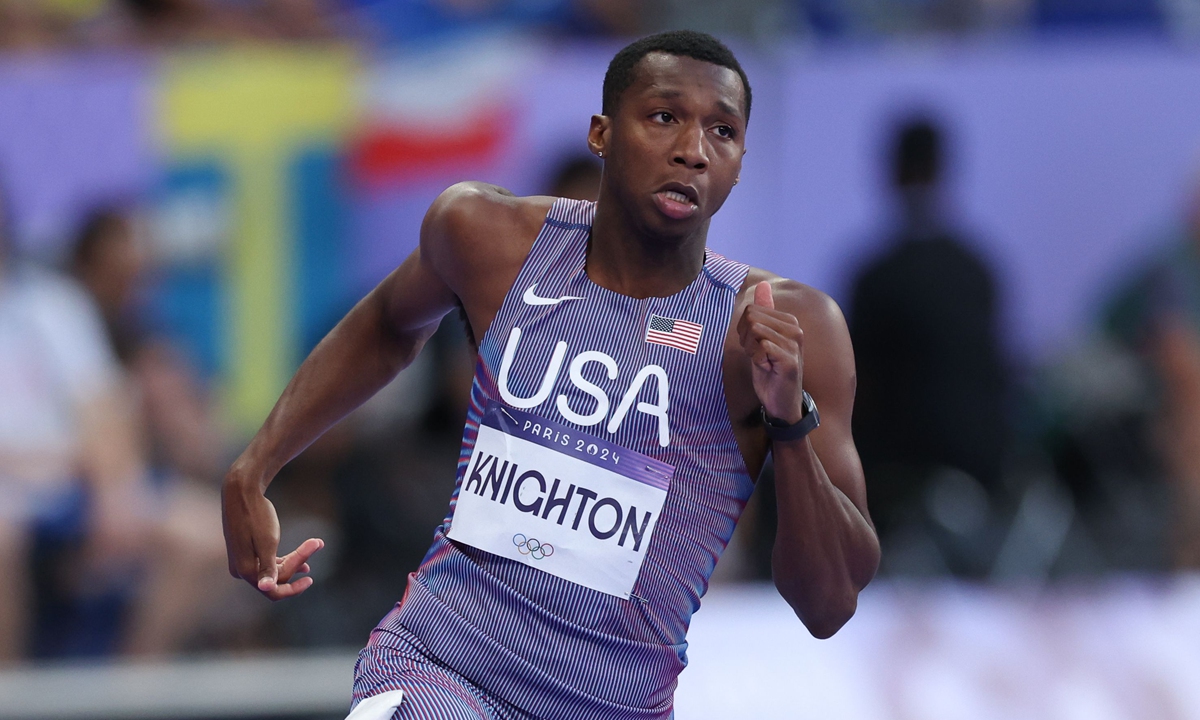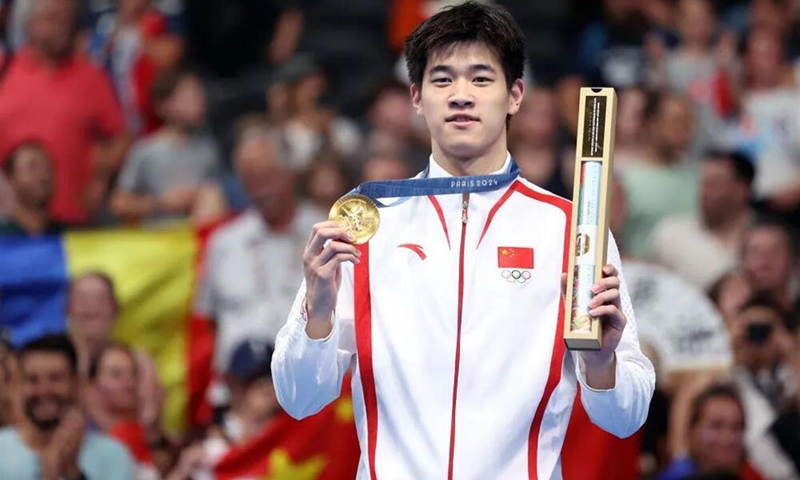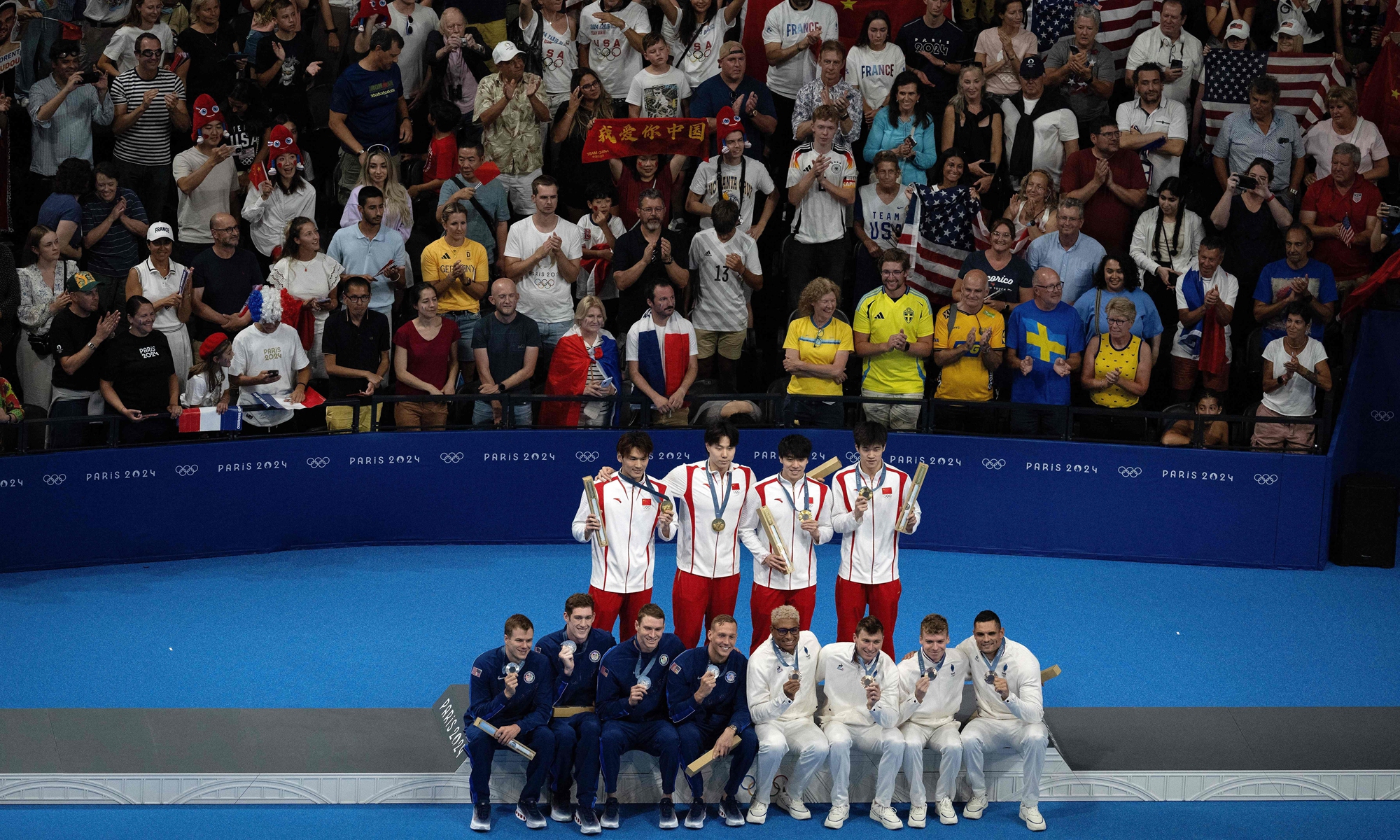
Erriyon Knighton of US wins his heat in the men's 200m Round 1 at the Paris 2024 Olympic Games on August 5, 2024. Photo: IC
China Anti-Doping Agency (CHINADA) on Tuesday reiterated its stance against double standards of the US Anti-Doping Agency (USADA) in a statement, saying that USADA is trying its best to clear American athletes after series of domestic cases while accusing CHINADA and the World Anti-Doping Agency (WADA) of "covering up the truth" and demanding sanctions against Chinese athletes.
In response to a Global Times report on Monday on the doubts surrounding US sprinting star Erriyon Knighton, an under-20 world record holder in the men's 200 meters who tested positive for banned steroid trenbolone during an out-of-competition test in March 2024, CHINADA said the case "shows that USADA's rhetoric about fairness and clean sport runs counter to its actual practices."
USADA had previously argued that the analytical result was incompatible with meat contamination and had sought a sanction of four years against Knighton, but it later abruptly decided before the start of the US qualifiers for the Olympics that no ineligibility would be imposed on Knighton, claiming that the athlete's positive result was caused by his ingestion of contaminated meat, and allowed him to eventually represent the US at the Paris Olympics.
WADA noted in June that it is difficult to understand how USADA can declare that "justice was served" in Knighton's case, as WADA President Witold Banka said it is "particularly intriguing" that USADA made the sudden U-turn.
Erriyon Knighton on Monday local time qualified for the semifinals of the men's 200m, which will take place on August 7 local time, according to Paris Olympics website.
Studies have shown that trenbolone is an anabolic agent with strong enhancing effects on strength and explosiveness, and is not a common contaminant, CHINADA said, noting the US has turned a blind eye to its long history of doping problems, but is obsessed with cross-border jurisdiction and asserting sanctions against other countries.
In the buildup to the Paris Olympics, the Chinese swimming squad was put under extreme scrutiny, due to the pressure by US media and even the US Department of Justice and the FBI. Both WADA and CHINADA were accused by the US media of "covering-up" a 2021 food contamination case as the Chinese swimmers were to compete in Paris.
The Chinese swimmers had to be tested in a more frequent way ahead of and during the Paris Olympics to prove their cleanness.
"I think the routine of seven doping tests in a single day has successfully disrupted our Chinese swimming team, " Chinese diving queen Gao Min wrote on Weibo last week.
Chinese swimmer Qin Haiyang expressed a similar viewpoint, stating that he believes some people are deliberately trying to disrupt Team China's preparation and mental state in this way. Nevertheless, he said he and his teammates would continue to focus on the competition and strive for more medals.
CHINADA had clarified they found no wrongdoings involving Chinese swimmers as early as 2021, followed by WADA and world swimming governing body World Aquatics, who found no evidence of irregularities, mismanagement or cover-up. But the findings were repeatedly ignored by USADA.
"It seems that the accusation and attacks on China and other countries is its tactic to deflect attention from the serious flaws in its own anti-doping work. This is sheer political manipulation and hypocritical double standards," said the CHINADA statement.
WADA president Witold Banka criticized the US for politicizing anti-doping and called it hypocritical and double standards in June, saying that 90 percent of athletes in the US do not enjoy the protections provided by the World Anti-Doping Code.
Shang Ximeng, a research fellow at the Center for International Sport Communication and Diplomacy Studies, Beijing Foreign Studies University, told the Global Times that the US wants to surpass the globally accepted unified set of anti-doping rules, the World Anti-Doping Code, and instate itself as an independent authority to counterbalance WADA.
"The US wants to position itself more prominently, or even dominantly, within the world anti-doping system led by the IOC and WADA, and to have others operate according to its rules," Shang said."The Rodchenkov Act grants the US judicial system independent authority to counterbalance WADA, allowing for separate judicial investigations and criminal sanctions on events or anti-doping cases it deems problematic. This reflects a double standard, as the act does not address issues within the US itself."
The Rodchenkov Act legislation passed in 2020 extends US law enforcement jurisdiction to any international sporting competitions that involve American athletes or have financial connections to the US, Reuters reported.
It was used to launch a US Department of Justice investigation recently into 23 Chinese swimmers who tested positive for a banned substance months before the Tokyo 2020 Olympics due to food contamination.
"There's a big issue when it comes to the ... Rodchenkov Act, and how that law has passed through Congress and the effect it could have in international sports," twice NBA champion and IOC member Pau Gasol told a press conference on Friday.
"The potential ability for US authorities to detain people potentially also, from my understanding, outside of US soil ... so this jeopardizes the safety of officials and people in the Olympic movement, in the sports movement."
WADA also unveiled that over 300 million doses of anabolic steroids were seized and prevented from entering Europe, while the US remains one of the world's largest markets for illicit steroids and performance-enhancing drugs.



